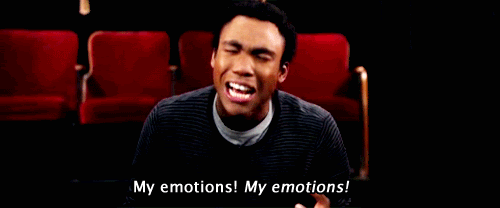And if I have to crawl upon the floor, come crashing through your door. Baby, I can't fight this feeling anymore.
Sorry I'm not sorry for getting this song stuck in your head. But since we learned so much about identifying and owning our feelings last week, today we are going to jump right back in and feel some more emotions. GET EXCITED.
If I could name one mental illness I have learned most about through clinical experiences at the hospital, it would hands down be bipolar disorder. You can only read about bipolar characteristics so much in books, but witnessing a manic or depressive episode and the swings between in person is on an entirely different level. As I started leading groups and realized how chaotic a room full of people experiencing manic episodes can truly be, I decided to educate myself on what to do!
So the overall goal of treatment for bipolar disorder and really for anybody is to maintain a baseline of moods and emotions. This obviously is incredibly difficult for anybody with a diagnosis of bipolar disorder. So what can we realistically do to combat or alleviate these mood swings?
Self awareness, my friends, seems to be the key to everything. After hearing the many stories of my patients with mood regulation issues, each individual with bipolar disorder is unique. Their manic and depressive episodes can look quite different and display unique symptoms. So, if anything is possible during my limited time with my patients, it is to encourage them to develop a better understanding of how their moods change and what that looks like.
For example, when during the day am I most likely to feel depressed or sad? What am I doing or who am I around when I happen to feel alone or lonely? Am I alert enough in the morning to get out of bed or go to work or take care of my kids? Often times, even I am unaware of my mood changes throughout the day. But understanding what factors may affect our moods can be incredibly helpful in regulating them.
So here is my super cool helpful mood chart. You write down your mood throughout the day, potentially adding in what you were doing, where you were, or what may have caused a mood change, in order to promote greater awareness. And once you fill it out, I would encourage the individual to find commonalities such as, "Oh, I seem to have a tendency to feel depressed in the evening when I am with my significant other," and from there behavioral changes can be made in order to alleviate the negative affects. For example in this situation that mean working in some alone time in the evening in order to let off steam if there are issues in the relationship causing added stress.
So there you have it, mood charting! TA-DAH! I would definitely suggest this for more people than just those with bipolar disorder. As I said, even I am sometimes unaware of my mood changes throughout the day. This could be helpful with a person struggling with a multitude of mental health issues, such as depression, anxiety, PTSD, etc.









